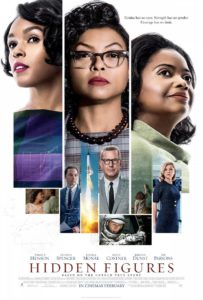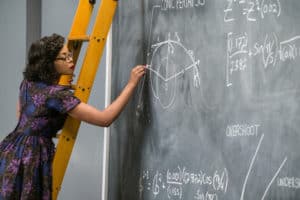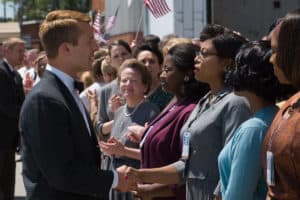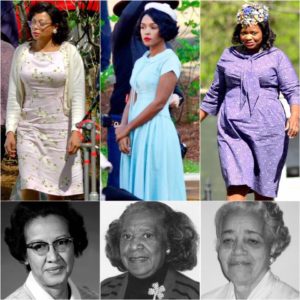Hidden Figures
 Based on the true story of a team of African American women working for NASA in the early 1960s, Hidden Figures focuses on three women who individually and collectively broke down the racial divide and were some of the key players in getting the US manned space programme literally off the ground.
Based on the true story of a team of African American women working for NASA in the early 1960s, Hidden Figures focuses on three women who individually and collectively broke down the racial divide and were some of the key players in getting the US manned space programme literally off the ground.
Back before there were computers as we know them – organisations requiring complex mathematical calculations hired teams of human “computers,” usually mathematically-gifted women who were barred from becoming engineers themselves. NASA was so large it employed two teams, one ‘White’ and the other ‘Coloured.’
 Mary Jackson (Janelle Monáe), Katherine Johnson (Taraji P. Henson) and Dorothy Vaughan (Octavia Spencer) are three friends working for the Coloured team, carpooling to work, supporting and encouraging each other. While they love the work, there are endless reminders of their second class status as women and women of colour – whether it’s being mistaken for the cleaning lady, searching for a “Coloured” toilet, or trying to borrow a book that’s only available in the “White” section of the library. At home their children ask questions that can only be answered “That’s just how it is.” But they manage it all – and one by one, break through the double-whammy barrier of being both female and African American.
Mary Jackson (Janelle Monáe), Katherine Johnson (Taraji P. Henson) and Dorothy Vaughan (Octavia Spencer) are three friends working for the Coloured team, carpooling to work, supporting and encouraging each other. While they love the work, there are endless reminders of their second class status as women and women of colour – whether it’s being mistaken for the cleaning lady, searching for a “Coloured” toilet, or trying to borrow a book that’s only available in the “White” section of the library. At home their children ask questions that can only be answered “That’s just how it is.” But they manage it all – and one by one, break through the double-whammy barrier of being both female and African American.
 While the story-line features all three women’s stories, Grammy-nominated Janelle Monáe, in her first leading role, stands out as Mary Jackson, youngest of the three. Monáe plays her with such fierceness and strong-willed determination, there clearly is nothing she cannot achieve should she put her mind to it. Taraji P. Henson plays the widowed Katherine Johnson as a staunch but lovable, slightly quirky genius who seems more befuddled than handicapped by the status quo. Kirsten Dunst has a brief, but interesting role as the White supervisor working with the Coloured computers. She embodies White niceness and good manners: oblivious to her sense of entitlement and superiority, she believes she means well.
While the story-line features all three women’s stories, Grammy-nominated Janelle Monáe, in her first leading role, stands out as Mary Jackson, youngest of the three. Monáe plays her with such fierceness and strong-willed determination, there clearly is nothing she cannot achieve should she put her mind to it. Taraji P. Henson plays the widowed Katherine Johnson as a staunch but lovable, slightly quirky genius who seems more befuddled than handicapped by the status quo. Kirsten Dunst has a brief, but interesting role as the White supervisor working with the Coloured computers. She embodies White niceness and good manners: oblivious to her sense of entitlement and superiority, she believes she means well.
Director Theodore Melfi (St Vincent, 2014) who also co-wrote the script with Allison Schroeder (Mean Girls 2, 2011) has lovingly crafted a seamless tale of hope and triumph that you can’t help cheering on.
 But… in Melfi’s vision – his three amazing heroines are a bit like Mary Poppins – practically perfect – too understanding – too accepting – too courageous – too picture perfect. I love that this movie is based on three real women of colour who really did get John Glenn into space and back, who became engineers and programmers and broke down racial and sexual barriers. I’m so glad it was made because their story should be told – but I know if I could talk to Katherine Johnson, Dorothy Vaughan or Mary Jackson – they would tell me it was a hell of lot tougher getting there, they had doubts, their marriages suffered and their children missed them. There were days they looked like hell and days they could barely contain their rage and frustration.
But… in Melfi’s vision – his three amazing heroines are a bit like Mary Poppins – practically perfect – too understanding – too accepting – too courageous – too picture perfect. I love that this movie is based on three real women of colour who really did get John Glenn into space and back, who became engineers and programmers and broke down racial and sexual barriers. I’m so glad it was made because their story should be told – but I know if I could talk to Katherine Johnson, Dorothy Vaughan or Mary Jackson – they would tell me it was a hell of lot tougher getting there, they had doubts, their marriages suffered and their children missed them. There were days they looked like hell and days they could barely contain their rage and frustration.
But if Melfi has glossed over the mundane realities of their struggle – he’s still spun a good story, well worth seeing. And yes, sometimes the good guys really do win.
4 stars
Veronica McLaughlin
Watch the trailer:
- Mice on Stilts & Estère – Shooting Up K Road on a Saturday Night, 25 March 2023 - March 26, 2023
- Honouring Rachel Webb – 13th Floor Ace Photographer - August 13, 2022
- Movie Review: Queen Bees Directed by Michael Lembeck - August 5, 2021
